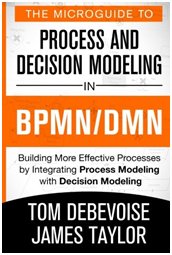Decisioning systems need to fit in with existing processing systems.
There are five easy steps for deploying decisions using a combination of three core patterns – patterns suited for Legacy Systems, for Commercial Software Packages and for Modern Decision-Centric Systems respectively. This recipe allows for incremental changes that can be directed systematically for a powerful digital transformation.
Step 1- Pull Decisions out of Processes
Explicitly defined and managed decisions (a) simplify processes by abstracting the embedded business logic, and (b) allow knowledge to be injected into processes in the form of advanced analytical models and business rules.
























